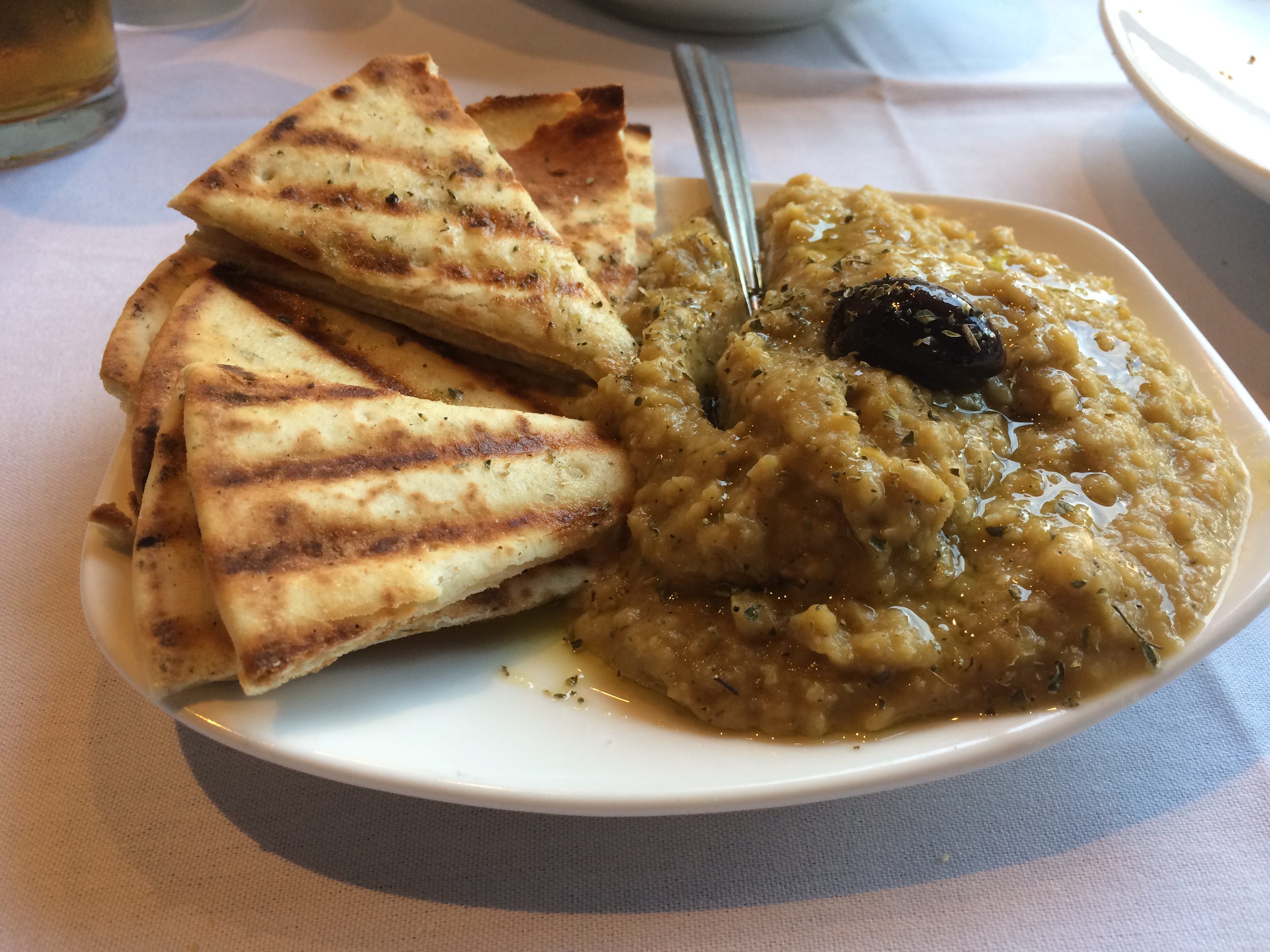
Bernie Whitmore
Meze Estiatorio
166 Shrewsbury Street, Worcester
(508) 556-4242
My first encounter with Greek cuisine came as a series of epiphanies. Mundane fruits and vegetables exploded with fresh juicy flavor. Ranging from simple salads to highly refined traditional entrees and desserts, each meal was an awakening to what food can and should be. The blazing Greek sunlight might grow tastier herbs and vegetables, but the Greeks themselves skillfully blend them to make delicious meals they can take pride in.
And that was just the bounty of the land; seafood from the surrounding Aegean multiplies the range of Greek cuisine.
That, in short, discloses my bias toward Greek food and why I’m eager to find restaurants that serve it; especially those that follow the tradition of honest flavor, freshness and simplicity. Please! No hiding behind canned and frozen shortcuts.
I think we’ve found those qualities in Meze Estiatorio. For example, let’s begin with the snack your server greets you with; a plate ringed with large slices of rustic bread, grilled and drizzled with olive oil, surrounding a mix of green and black olives. Hospitable and tasty – the mood is set.
In prior visits to Meze, with larger groups, we’ve ordered the Greek Charcuterie board; a wide sampling of meats, cheeses, fruit and nuts. But this evening happened to occur in Worcester’s Restaurant Week, so my companion ordered one of the 3-course specials that started with Pantzaria, a salad of blanched beets heaped with sugared walnut pieces, crumbles of feta cheese and red onion. The ruby-red beets had marinated in balsamic vinegar to attain an extra dimension of deep fruit flavor and, better yet, the portion was more than enough for sharing so, fork in hand, I dug in.
Happily, Meze’s kitchen didn’t use canned beets like we’ve experienced at several area restaurants recently. These beets were cut by hand in uneven chunks, firm and delicately flavorful. If you’re going to put out a beet salad, take some time and do it right!
The Meze Plate allows the you to mix-and-match from five different Greek specialty dips, so everyone at the table is able to select their favorite – or, better yet, sample something new. I decided to try their Fava dip, smashed split peas and garlic drizzled with olive oil and served with triangles of grilled pita bread dusted with herbs. This was garlic they way I prefer it: spicy-hot and assertive. It would match up nice with clean and refreshing Tzatziki.
From there, my companion moved on to his entrée of Grilled Swordfish, a 6-ounce steak grilled and served with a lemon caper sauce and long wedges of buttery lemon potatoes. The swordfish was fresh and perfectly grilled; its fragile flavor was offset by a tangle of deep-forest green sautéed ‘horta’ – a Greek term for bitter greens. I speculated dandelion, but a server informed us that it was actually chicory sautéed till soft and then tossed on ice before the stems could evanesce.
After several dinners at Meze, I freely admit that I’ve settled into a prosaic habit with my entrée selection. But it’s a happy one, for where else do you encounter Oktapodi on a menu? Meze’s chefs brine and smoke octopus tentacles for 48 hours then grill and serve them over chopped red onions and balsamic vinegar reduction. They may look like something from a 50’s-era sci-fi movie, but the flavor and tender texture remind me of the delightful experience of my first serving of calamari. Meze’s grilling and dusting of herbs add texture and develop a richness of flavor that I find addictive.
I paired my food courses with Lunch, an American IPA brewed by the Maine Beer Company. It’s mid-level alcohol and piney-sweet bitter tones highlighted rather than dominated.
The Restaurant Week menu included dessert and my friend’s choice was Meze’s Galaktoboureko, a Greek specialty composed of a thick layer of creamy semolina custard wrapped within layers of paper-thin crispy filo and drenched with a sticky-sweet syrup. Happily, the portion size was plenty large enough for sharing and arrived with two spoons. Our server informed us that we’d received the last portion; if they’ll allow it, I recommend you ask them to set one aside for your table – galaktoboureko should not be missed!
Out of curiosity I wondered what an Estiatorio is and looked it up: “A Greek restaurant, especially one that is more upmarket and elaborate than a taverna”. Meze Estiatorio is certainly sophisticated and, more importantly, keeps alive the tradition of Greek dining.







